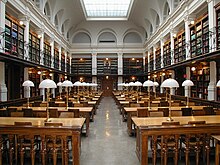Education
Education is about learning skills and knowledge. It also means helping people to learn how to do things and support them to think about what they learn. It is also important for educators to teach ways to find and use information. Education needs research to find out how to make it better.[1][2]
Through education, the knowledge of society, country, and of the world is passed on from generation to generation. This may include education in morality, for example learning how to act as loyal, honest and effective citizen.

Education may help and guide individuals from one class to another. Educated people and groups can do things like help less-educated people and encourage them to get educated.


Types of education
changeThere are different ways to categorize education: for example, by age or subject. One way is to divide it into formal education, non-formal education, and informal education.
Formal education is usually in school, where a person may learn basic, academic, or trade skills. Small children often attend a nursery or kindergarten but often formal education begins in elementary school and continues with secondary school. Post-secondary education, or higher education, is usually at a college or university which may grant an academic degree.
Or, students may go to a City college where they learn practical skills. This way learners can become qualified to be plumbers, electricians, builders and similar occupations. These course have arrangements for students to get practical experience. Apprenticeship was the older way to do this,
Non-formal education includes adult basic education, adult literacy education or school equivalency preparation. In non-formal education, someone who is not in school can learn to read, write, and other basic life or job skills. Home education, individualized instruction, such as programmed learning, distance learning and computer-assisted instruction are other possibilities.[3]
Informal education is less organized.[4] It may be a parent (like a dad or mom) teaching a child how to make a meal or ride a bicycle. People can also get an informal education by reading many books from a library or educational websites. This may also be called self-education. Some famous people have been largely self-educated, like Alfred Russell Wallace.
Distance Education is typically conducted through online platforms,[5] correspondence courses, or virtual classrooms, enabling flexible learning schedules and access for students who cannot attend traditional on-campus class
There are primary schools and secondary schools. In many places they are government funded. Colleges and universities usually charge fees, or tuition payments.
Learning theories
changeA developmental theory of learning was explained by psychologist Jean Piaget. It has four stages of learning through which children progress on their way to adulthood: the sensorimotor stage, pre-operational stage, concrete operational, and formal operational stages.[6]
Teaching methods
changeA teaching method is the way via which educational content is delivered by the teacher. For instance, group work is sometimes used rather than individual learning to make students grasp certain knowledge. There are many teaching methods, and the most effective one in a given (situation or) scenario depends on things like the subject matter and the learner's age and ability, or level of competence.[7][8]
One important part of teaching methods is to make sure that learners stay motivated, either through their own interest and curiosity or through rewards (that are outside of one's mind).[9]
Educational assessment is the process of making documentation of the student's knowledge and skills; That can happen formally or informally and can take place before, during, or after the learning activity.
Another significant (part of teaching or) pedagogical element in many modern ways of educating, is that each lesson is part of a broad framework; The framework is (supposed to follow a syllabus or) governed by a syllabus; The syllabus can cover several months or years.[10]
According to Herbartianism, teaching can be broken down into (parts or) phases. The first phase has to do with making the student's mind ready for new information. Subsequently (or thereafter), new ideas are (shown or) introduced to the learner and then linked to (ideas or) concepts that are already familiar to them..[11]
Related pages
change- Curriculum
- Distance education
- Homeschooling – education at home
- Pedagogy
- Inclusive education
- Special education – education of students who have a disability
- Subject (school)
- Right to education
- Studypool tips
References
change- ↑ Anderson, Garry & Arsenault, Nancy 1998. Fundamentals of Educational Research. Routledge. ISBN 978-0-203-97822-1 [1]
- ↑ Gitomer, Drew H. & Bell, Courtney A. (eds) 2016. Handbook of research on teaching. AERA.
- ↑ U.S. Department of Education, Evaluation of evidence-based practices in online learning: a meta-analysis and review of online learning studies, 2010. [2]
- ↑ Rogoff, Barbara; Callanan, Maureen; Gutiérrez, Kris D.; Erickson, Frederick 2016. The organization of informal learning. Review of Research in Education 40: 356–401. [3]
- ↑ Sharma, Bharat (7 May 2022). "This App Connects Students To Tutors In Less Than 60 Seconds: Should You Use It?". India Times. Retrieved 11 January 2023.
- ↑
- Murphy, Mufti & Kassem 2009, pp. 90–91
- Bartlett & Burton 2007, pp. 96–97
- ↑
- Bartlett & Burton 2007, pp. 81–5
- Peel 2023
- Murphy 2003, pp. 5, 19–20
- ↑
- ↑
- ↑
- Peel 2023
- Bukoye 2019, p. 1395
- Doukakis et al. 2022, pp. 71–72
- Lamprianou & Athanasou 2009, p. 31
- ↑